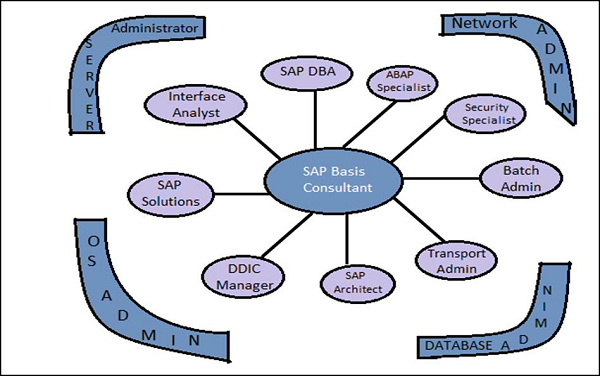Before we talk about SAP Basis Administrator, let us understand what SAP is.
SAP is ERP (Enterprise Resource Planning) software by the same name as the company. SAP is an acronym which stands for “Systems, Applications, and Products in data processing.”
An ERP is simply a logical representation of the business which is centrally connected, helps in doing the necessary transactions and real-time reporting. Each function is handled by the respective module in SAP (or any other ERP) software. For example, SAP has modules called Sales & Distribution (SD), Advanced Planning and Optimization (APO), Quality Management (QM), Purchasing (MM-PUR) Warehouse Management (WM), Production Planning (PP), Finance (FI) and many others.
You can do customization in SAP through a language called ABAP. This requires coding knowledge. This is called the technical part of SAP.
The primary responsibility of an SAP Basis Administrator is the management of the SAP environment. His/her full duties include monitoring, configuring, tuning, and troubleshooting the SAP technical environment.
The administrator is required collaborating the SAP transport and source code problems. He is also expected to install, upgrade and maintain the SAP system.
A major area of responsibility is the documentation and updating of the existing SAP environment. He is also required to work with IT and business units to modernize the SAP environment.
The SAP Basis Administrator must have the ability to analyse situations and provide resolution. Excellent oral and written communications skills are an added requirement.
Some the responsibilities of the SAP Basis Administrator are listed below
- Implement and maintain the multiple SAP instances that comprise the environment.
- Retaining the integrity of the SAP environment by the CTS (Correction and Transport System) to ensure all the configuration and development objects are promoted properly.
- Must be able to introduce technical changes into the environment while minimizing risk and achieving high reliability, availability, and performance.
- Design and implement an optimal SAP configuration.
- Install and configure all required SAP database servers.
- Manage SAP users, authorizations, and profiles.
- Distribute the online SAP user workload and monitor the SAP background workload.
- Configure and manage the SAP printing subsystem for all SAP instances.
- Maintain SAP performance by planning and executing SAP tuning strategies.
- Monitor all SAP systems
- Administer the SAP database with Database Administrator (plan and perform database upgrades, apply database maintenance, perform database reorganizations, design and maintain physical database layout, maintain database security, design and implement backup and restore strategy, database problem determination, administer database performance, manage database storage, and resolution.
- Work on the SAP client administration as required.
- Participation, planning, and implementation of SAP system upgrades.
- Apply and migrate SAP maintenance both the hot packages and kernel upgrades. This can be done through all systems using a structured methodology.
- Develop and maintain system documentation for all SAP instances and interfaces.
- Provide status reports for projects to management.
Being an SAP basis administrator is a lucrative career. However, several responsibilities are required to take up. Getting trained to become one is necessary. Finding the best institute will go a long way in helping you build your career. Associating with an SAP Basis Online Tutorial is among the best option available.


